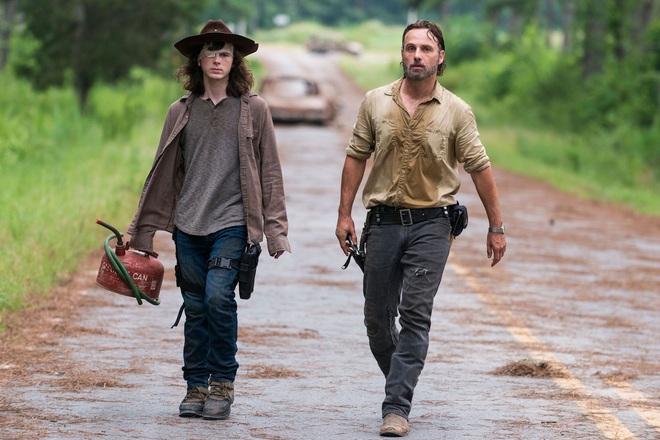Labeled a “Dead Show,” How Did the New Season of The Walking Dead Earn the Highest Rating in the Series’ History?
For fans of action-horror series, The Walking Dead is likely a familiar name. Adapted from the comic book series by Robert Kirkman (writer) and Tony Moore (artist), the show became a global phenomenon upon its debut in 2010 and has been hailed as one of the best post-apocalyptic/zombie dramas of the past decade.
However, in the last three years, many viewers have turned their backs on the show, criticizing it for a decline in quality. The storyline began to feel aimless, and the suspense—once defined by sudden, terrifying walker attacks—faded away.
Once praised as the best zombie series of the decade, The Walking Dead experienced a major downfall.
Seasons 7 (2016) and 8 (2017) marked a dramatic dip, drawing scathing reviews from critics and sparking outrage from fans across social media. The “dead show” label was born, despite the show still pulling impressive viewership numbers.
It wasn’t until mid-Season 9 (2018) that the series found its footing again, returning to form in Season 10—now eight episodes in on AMC. Season 10 has earned the show’s highest Rotten Tomatoes rating ever (91%), surpassing even Season 1 (88%). And that comeback wasn’t easy.

A Promising Start…

Back in 2010, The Walking Dead premiered with officer Rick Grimes waking to a post-apocalyptic nightmare. At that time, the concept of “walkers” was still new and terrifying—get bitten, and you slowly turn into one of them.
Gruesome visuals, shocking twists, and horrifying tension made the early seasons hauntingly addictive. The show’s diverse cast, each character with a unique backstory, emphasized that in the apocalypse, only unity could help people survive the darkness.
The first two seasons redefined action-horror TV, with human instincts and morality clashing in brutal situations—like Glenn risking his life to save a stranger, or Shane sacrificing Otis to survive. The shocking revelation that everyone was infected—turning into walkers after death, bite or not—pushed the survival stakes even higher.
...To Peak Post-Apocalyptic Storytelling

Over the next four seasons, the conflict shifted from humans vs. walkers to humans vs. humans. Communities formed and battled over food and medicine. Walkers remained dangerous, but other survivors became even more threatening.
Some fans started to lose interest, especially as characters began dispatching walkers with ease. But new villains reignited the tension—Governor, a seemingly polite tyrant, and Gareth, who turned out to be a cannibal in disguise.
Season 3 cemented this shift, showing that in the apocalypse, trust is a liability. Ultimately, Rick’s core group stuck together, despite countless tragic losses.
Season 6’s finale introduced one of the most iconic villains—Negan. With a barbed-wire bat in hand, he forced Rick’s group to kneel and prepared to kill one of them. Viewers were left hanging until Season 7, unsure of who would die.
A Brutal Cliffhanger and a Decline
Season 7’s opener delivered a brutal twist: fan-favorite Abraham was killed, followed shockingly by Glenn—punished for Daryl’s impulsive outburst. The double-death devastated viewers.
But the excitement quickly faded. The pacing slowed, plots dragged on, and aside from Negan’s twisted charisma and the Rick–Daryl bromance, fans felt let down. Even Carl, Rick’s son, was shockingly killed in Season 8, a decision that alienated longtime fans.
Angela Kang Revives the Franchise
Season 9 began under a cloud of skepticism, especially as Rick exited by Episode 5. Actor Andrew Lincoln had announced his departure, but rather than kill Rick, the writers had him saved by a mysterious group—setting up future spinoff films.
Oddly enough, Rick’s exit sparked a creative revival. Enter The Whisperers, eerie villains who wore walker skins and whispered to one another, blending in with the dead. Their presence brought back the fear and suspense of early seasons.
Thanks to new showrunner Angela Kang, The Walking Dead got a second wind. The pacing improved, action scenes thrilled, and character development felt focused again. The Whisperers' arc was unsettling in a psychological way, restoring the chilling atmosphere fans craved.
As Season 10 launched in October, Danai Gurira (Michonne) confirmed her departure, signaling another major transition. But with veterans like Norman Reedus (Daryl), Melissa McBride (Carol), and Jeffrey Dean Morgan (Negan) still on board—and Kang’s sharp direction—fans can believe The Walking Dead isn’t just surviving, it’s thriving again.

![REPORT: RHOSLC’s Whitney Rose Allegedly Shuts Down Beauty Company and Quietly Rebrands It After “Los[ing] a Fortune” as Whitney Issues Denial REPORT: RHOSLC’s Whitney Rose Allegedly Shuts Down Beauty Company and Quietly Rebrands It After “Los[ing] a Fortune” as Whitney Issues Denial](https://i-1.cybergalleria.com/uploads/images/tinymce-uploads/20250503/Betterimage_ai_1746272454017-1746272459-q80.webp)

-1745813054-q80.webp)